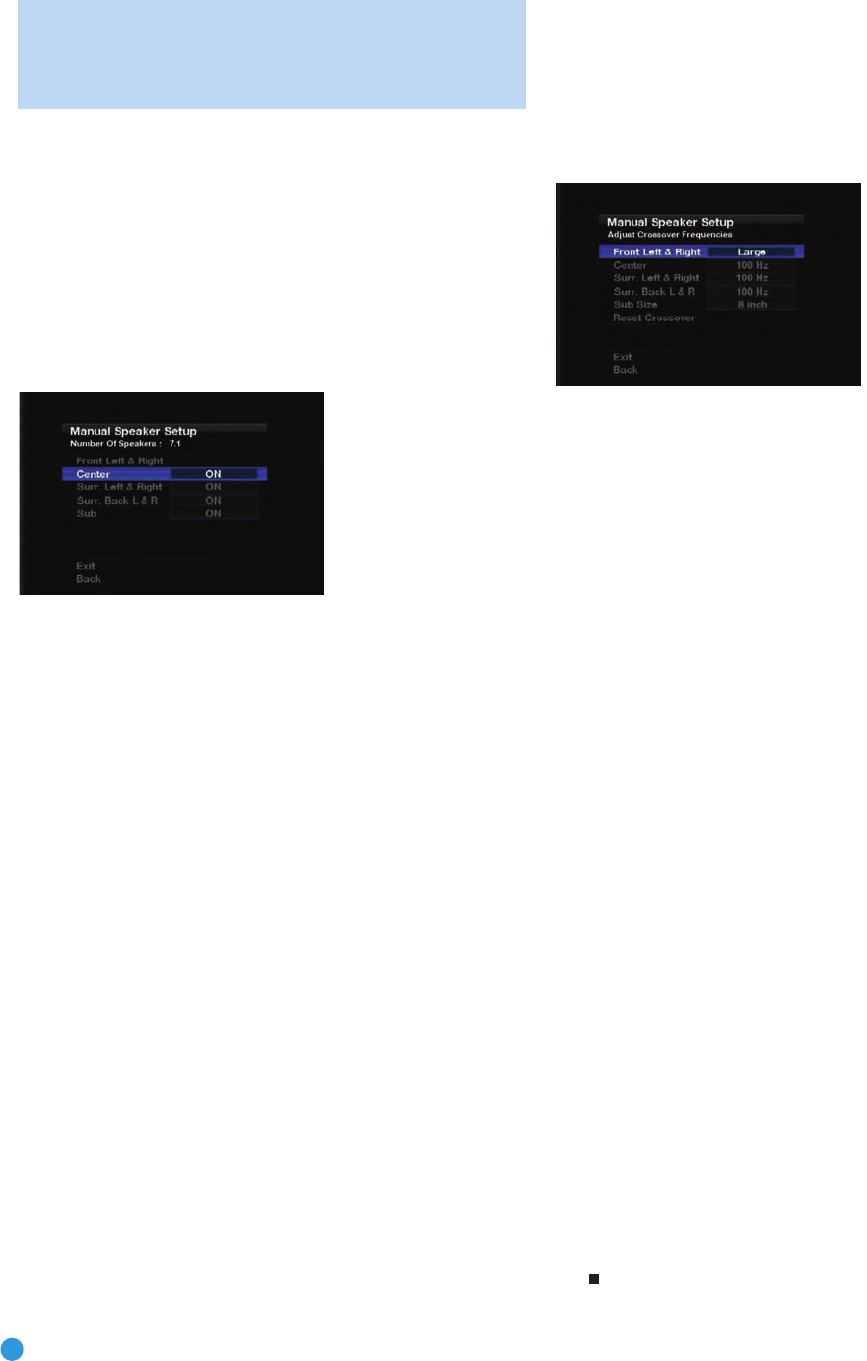
46
ADVANCED FUNCTIONS
NOTE: All of the speaker setup submenus include the Exit and
Back options as shown at the bottom of Figure 58. To return
to a previous menu without making any changes, select Exit.
To save the current settings, select the Back option.
If you previously saved EzSet/EQ results in this setup position and you
wish to reconfigure the speakers from scratch, select the Reset option.
For best results, we recommend configuring the speakers in this order,
although it may differ from the order in which the submenus appear in
the Manual Speaker Setup menu: Number of Speakers, Crossover
(Size), Sub Mode, Distance and Level Adjust.
Number of Speakers
Move the cursor to the Number of Speakers line and press the Set
Button. See Figure 61.
Figure 61 – Number of Speakers Menu
The Number of Speakers menu lists each of the speaker groups.
Program the correct setting for each group: ON when the speakers are
present in the system, and OFF for positions where no speakers have
been installed. The Front Left & Right speakers are always ON and may
not be disabled. Any changes made to the system configuration will be
reflected in the total number of speakers displayed at the top of the
screen.
The setting for the surround back speakers includes a third option:
Zone 2. The AVR 254 is capable of multizone operation, allowing place-
ment of a pair of speakers in another room. Listeners in the remote room
may enjoy either the same program as in the main room or a different
source. The AVR 254’s assignable surround back amplifier channels make
multizone operation easier than ever, since an external power amplifier is
not required. Simply select the Zone 2 option at this line, and connect the
Surround Back Speaker Outputs to loudspeakers located in the remote
room. The main room will be configured automatically for up to 5.1
channels. See the Multizone Operation section for more information.
The settings in this menu affect a number of aspects of the AVR’s
operation, including the remainder of the speaker setup process and
the availability of various surround modes at any time.
When you have finished programming the number of speakers in the
system, select the Back option to insure the settings are saved correctly.
You may use the Back/Exit Button, and the settings will be saved.
Adjust Crossover Frequencies Menu
After you have programmed the number of speakers in the system, the
AVR will return to the Manual Speaker Setup menu, similar to the one
shown in Figure 46. Navigate to the Crossover (Size) line and press
the OK Button to display the Adjust Crossover Frequencies menu (see
Figure 62).
Figure 62 – Adjust Crossover Frequencies Menu
The AVR will only display those speaker groups which you programmed
in the Number of Speakers menu.
Refer back to Step One, where you determined each speaker’s
crossover. For the main speakers, this is the lowest frequency the
speaker reproduces well; and for the subwoofer, it’s the highest.
For each main speaker, select one of the seven crossover frequencies:
40Hz, 60Hz, 80Hz, 100Hz, 120Hz, 150Hz or 200Hz. If the crossover
frequency you determined in Step One is below 40Hz, select the first
option, “Large”. This setting doesn’t refer to the speaker’s physical size,
but to its frequency response, which is also called “full range”.This means
the speaker is capable of playing sounds throughout the frequency
spectrum, from the high pitches to the bass.
Specify the size of the subwoofer’s transducer as 8, 10, 12 or 15 inches.
Make a note of each speaker group’s crossover setting in Table A3 in
the appendix.
When you have finished entering the settings, remember to select Back,
not Exit.
Sub Mode
Move the cursor to the Sub Mode line to program bass management
for the subwoofer. The subwoofer’s setting depends upon how you
programmed the front left and right speakers.
• If you set the front speakers to a numeric crossover frequency, the
subwoofer setting will be LFE, and you won’t be able to change it.
All low-frequency information will always be sent to the subwoofer.
If you don’t have a subwoofer, we recommend that you either
upgrade to full-range speakers or add a subwoofer to your system
at the earliest opportunity.
• If you set the front speakers to LARGE, you may select between
two possible settings for the subwoofer.
L/R+LFE: This setting sends all low-frequency information to
the subwoofer, including both information that would normally be
AVR254om.qxd 3/28/08 12:46 PM Page 46


















